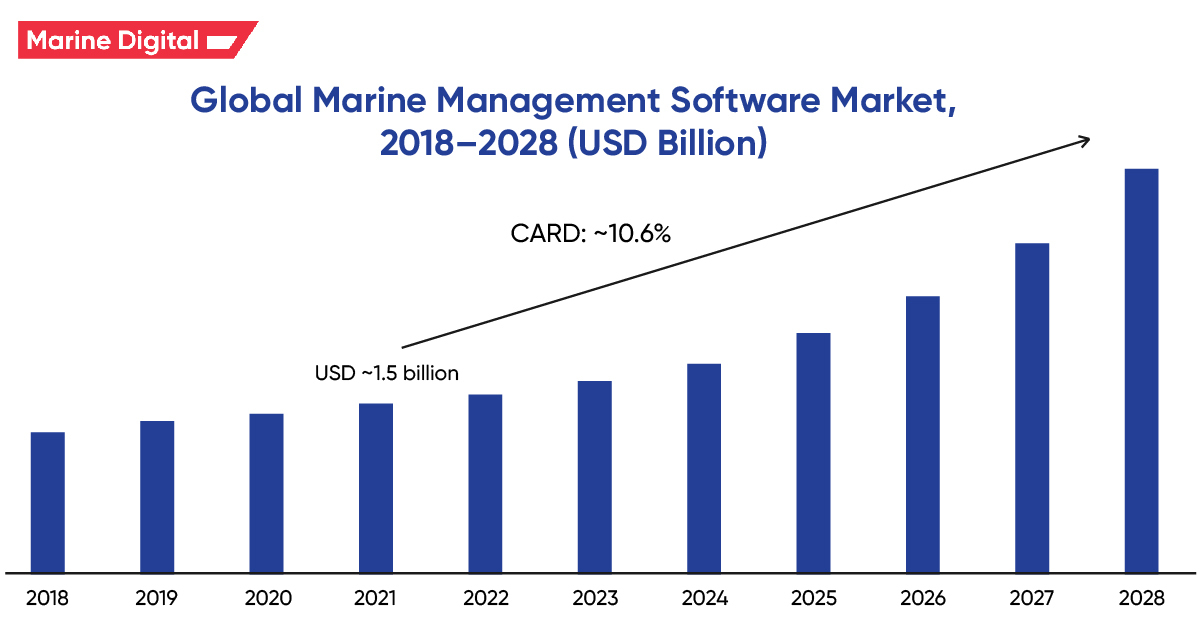Marine Management Software Market Overview
The global marine management software market size is predicted to register a significant CAGR of ~10.6% during the forecast period 2018 to 2028 and was valued at USD 1.5 Billion in 2020
The marine management software helps the boatyards, marinas, and boat dealers to manage complex supply chain operations efficiently and results in boosting performance. The software provides ship management data to the ship owners and managers and helps them make the operations leaner and more efficient. Further, the rising transportation services through waterways have made it essential for the marine industry to use digital technologies for collecting, processing, storing, distributing, and presenting data to the participants. The marine management software offers better trade services, enhances safety, and helps to improve the warehouse management system. This software provides the cargo information about the ships departing from various ports, and helps to identify the schedules of these ships for better communication and trade. The well-connection information exchange between the ships helps to achieve better coordination, and reduce maritime accidents at bay. Moreover, integration with the enterprise resource planning software allows supply chain visibility, reduces freight delivery cost, and improves business decisions.

The outbreak of the COVID-19 pandemic has had a negative impact on the global economy as it has impacted various sectors, such as BFSI and IT&telecom, significantly. The pandemic has resulted in the implementation of lockdown restrictions and travel limitations in many countries across the globe, resulting in the disruption of the supply chain of goods and materials and market demand. Moreover, the limitations on trades, shutting down manufacturing sites, the decline in the production rate, cash flow constraints, and unavailability of workers have led to the fall in the cash flow margins of the stakeholders in the global market. The virus mostly affected SMEs, but large organizations also had significant impacts. COVID-19 has also impacted the marine management software market across the globe. The pandemic has caused the maritime industry to face the most unpleasant period due to the halt in the transportation of all types of cargo through waterways, as there could have been the chances of carrying the virus through the shipment of these goods from one port to another thereby affecting a large number of employees working in the industry. This widespread pandemic has largely impacted the shipping industry globally by affecting the trade chains, which mainly include international import and export trade. Moreover, a ban has been imposed on most of the vessels and containers transported from China by various countries thereby hampering the operations of these industries.
COVID-19 Analysis
The major factors driving the growth of the marine management software market are the rising need for managing complex supply chain operations and database management solutions and the increasing demand for waterway transportation activities. However, issues related to cyber threats are hindering market growth. Although, the growing adoption of cloud-based marine management solutions is creating an opportunity in the market.
Marine Software Market Dynamics
The marine and shipping industry involves a number of complex processes and has to deal with dynamic market conditions. The implementation of digital technologies in the marine industry emerges as an opportunity to modernize operations and create smarter ships and fleets. The increase in consumer demand for various goods has resulted in the growth of the global supply chain. This has eventually surged the demand to implement new methods for efficiently managing operations and achieving optimized productivity. The use of marine management software helps in data collection, storage, processing, presentation, and distribution across different participants in the maritime industry. This software is integrated with advanced technologies such as AI, Analytics, and Big Data, which allows the end users to digitally organize their inventory data, monitor and manage shipping and tracking details and generate electronic invoices with ease. The marine management software helps to minimize time and money spent on shipping, tracking, and compiling data, thereby forming huge demand in the industry.
Marine Software Market Drivers
The threat of cyber-based attacks targeting marine management software is a key concern in the global market. Cyber threats are an important concern for the effective functioning of marine management software. Cyber threat refers to a malicious act, which leads to damage and disruption of software, and data theft, hindering system effectiveness. Data breaches, unauthorized commands, and Denial of Service (DoS) are some of the types of cyberattacks. Cyberattacks cause system failure, which leads to improper functioning of the software. Henceforth, marine management software must be designed to prevent cyber-attacks and mitigate their risks. Cybersecurity plays an important role in ensuring the safety of transporting, tracking, and managing databases in marine management software.
Maritime Software Restraints
The global marine management software market has witnessed significant growth in the past decade due to technological changes and is expected to grow at a steady rate in the upcoming years. The value chain analysis of the marine management software market comprises four major levels: hardware/software providers, cloud vendors/service providers, system integrators, and end-users.
Value chain analysis
The global marine management software market has been segmented based on component, deployment mode, location, organization size, application, end-user, and region.
By component, the global marine management software market has been divided into software and services. The software segment is further bifurcated into tracking and monitoring, supply chain and logistics, navigation and routing, system testing, finance and accounting, and others. The services segment is further divided into professional services and managed services.
By component, the global marine management software market has been divided into software and services. The software segment is further bifurcated into tracking and monitoring, supply chain and logistics, navigation and routing, system testing, finance and accounting, and others. The services segment is further divided into professional services and managed services.
- Based on deployment mode, the global marine management software market has been segmented into on-premise and cloud.
- Based on location, the global marine management software market has been segmented into onboard and onshore.
- Based on organization size, the global marine management software market has been segmented into SME and large enterprises.
- Based on application, the global marine management software market has been segmented into crew management, harbor management, port management, cruise and yacht management, and reservation management.
- Based on end-user, the global marine management software market has been segmented into defense and commercial.
Marine Software Market Segmentation
Geographically, the global marine management software market has been categorized as North America, Europe, the Asia-Pacific, the Middle East & Africa, and South America. North America is likely to be the dominant regional market due to the faster adoption of advanced technologies in developed countries in the region—the US, Canada, and Mexico. This is mainly due to the region being one of the most technologically advanced regions with the presence of a large number of market players such as Oracle (US), DockMaster (US), Scribble Software (US), and MarineCFO (US). The Asia-Pacific is expected to advance at the highest CAGR during the forecast period due to the growing utilization of technologies. The growth of the marine management software market in Asia-Pacific is expected to be influenced by growing adoption of modern technologies, as well as the increasing numbers of small and medium enterprises (SMEs). The increasing technological adoption, focus on innovations obtained from R&D and technology, more IT organizations, and ongoing projects will boost the market in the Asia-Pacific region.
Maritime Software Regional Analysis
The global marine management software market is witnessing high growth mainly due to the growing need for managing complex supply chain operations and database management solutions and increasing demand for waterway transportation activities. Major players have opted for partnerships, acquisitions, and product developments as their key organic growth strategies to enhance their positions in the market and cater to the demands of organizations across end-use verticals. Additionally, the industry players are working towards advancing their product offerings to cater to the rising needs of end-use organizations to provide robust services intended towards achieving accuracy and sustaining the clients for longer relationships.
Marine Software Competitive Analysis
- Oracle (US)
- ABB (Switzerland)
- DockMaster (US)
- Marina Master (Slovenia)
- Lloyd's Register (UK)
- Marinacloud (Croatia)
Key Players
- On 13th July 2021, ABB launched a new digital solution- Ability Marine Fleet Intelligence Advisory, which helps to optimize ship performance across fleets. This combines the power of cloud-based analytics and reporting along with user-friendly visualizations to guide the managers, shipowners, and charterers and help them bring greater efficiency and sustainability.
- On 10th June 2021, Yaringa Boat Harbour, located southeast of Melbourne on the waterways of the northern arm of Westernport Bay, partnered with Marina Master to improve their marina management system and customer experience.
- On 28th April 2021, Lloyd's Register and Falkonry, an innovation leader in Operational AI, combined Operational AI Digital Twins into Asset Performance and Risk Management solutions for chemical, oil & gas, and heavy industries. This partnership will help to generate a holistic plan for ongoing maintenance activity based on optimizing productivity, new operational conditions, and profit by reducing unscheduled downtime.
- On 17th February 2021, ABB Marine & Ports expands its business in Turkey and Saudi Arabia to grow its presence in these regions and support existing customers. This has strengthened the company's ability to work closely with its increasing client base in every country and collectively boost the efficiency and sustainability in ports, shipping, and offshore sectors in these regions.
Source: marketresearchfuture.com
Key Developments
- In March 2022, Marine Digital created an innovative web dashboard showing the CII of the fleet, its historical dynamics and forecast for the future. The initial CII estimate is based on historical data and digital twins of the ships.
Nowadays we are focused on fleet operations energy efficiency and decision support. We apply machine learning algorithms to identify the optimization potential of the vessel and provide decision support for the fleet operators and other participants of the supply chain aiming to reduce the carbon footprint and increase the efficiency of the operations. Our solution works within the following frameworks of efficiency analysis:
The IMO/MMSI of the vessel is necessary for the algorithm to give you a lot of fleet insights. We are glad to give free trial access for one of your vessels to test the solution and understand your voyage specifics in detail. Just write to us at hello@marine-digital.com

TOP 5 factors contributing to lower fuel costs for Shipping companies
Get a presentation with a full description of the features and free pilot project with trial of Marine Digital FOS for 2 months
"Clicking the button, you consent to the processing of personal data and agree to the privacy policy"

Get an overview "The Pathway to Zero Carbon Shipping:
IMO Compliance and CII Optimization through SEEMP" on email and download it for FREE! Leave your email now!
"Clicking the button, you consent to the processing of personal data and agree to the privacy policy, as well as consent to subscribe to the newsletter. "
Аdvantage of Fuel Optimization System from Marine Digital:

Marine Digital FOS can be integrated with other system and third-party's solutions through the API. To implement vessel performance monitoring for any vessel, we are using mathematical algorithms, machine learning and the same equipment as in FOS. The more data we collect from vessels, the more precise reports and recommendations our system will perform according to your individual requirements in fleet management.
If you have any questions about the solutions and the Marine Digital System platform, write to us, we will be happy to answer
If you have any questions about the solutions and the Marine Digital System platform, write to us, we will be happy to answer

Increased business process speed

Reducing to zero the number of errors

Best offer to the clients

Reduction in operating expenses
Have a questions?





